Deadly Force
Cannoneers of the Confederate Washington
Artillery
Undaunted
Valor- A Dedication to Duty
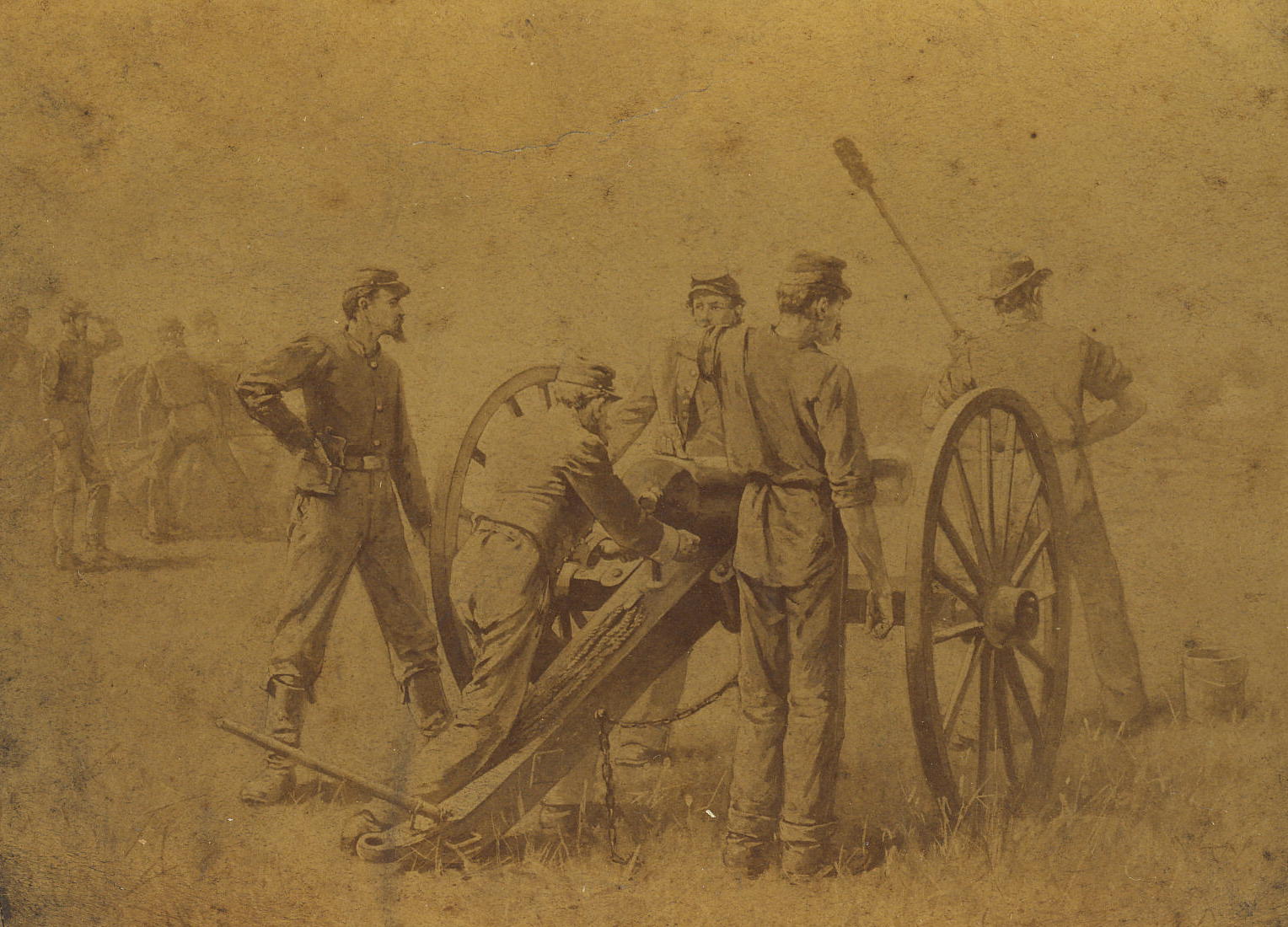
"Artillery Duel"- Washington Artillery
cannoneers in action
(click on image to become part of crew &
receive orders to fire cannon!)
The Washington
Artillery’s reputation of valor, honor, and deadly accuracy during the War
Between the States soon spread though
the North and South. It was not a disgrace to fall to the mercy of their deadly
fire. Its name was written in numerous newspapers and given laurels in many
battle reports. A good example of this fame was documented following the battle
of Drewry’s Bluff when a Yankee prisoner, Captain Belger, asked as he passed the
artillery unit, “What battery was that, that I was fighting?” One of its members
responded, “First Company, Washington Artillery.” The Captain’s expression then
changed, and he replied, “Damn that Washington Artillery! I have been looking
for it for three years and have found it at last.”
The art of
muzzle-loading artillery reached its lethal zenith during the Civil War. Its use
as support during an infantry attack, or repulsion of a frontal enemy attack
could serve as a great “equalizer.” Private Stephenson of 5th Company bragged
about his unit’s cannons. “Our guns were 12 pound brass Napoleons, smooth bore,
but accounted the best gun for all round field service then made. They fired
solid shot, shell, grape and canister, and were accurate at a mile. We would not
have exchanged them for Parrot [sic] Rifles, or any other style of guns. They
were beautiful, perfectly plain, tapering gracefully from muzzle to “reinforce”
or “butt,” without rings, ridges, or ornaments of any kind. We are proud of them
and felt towards them almost as if they were human, although for that matter our
attachment suffered the pangs of all attachments in this world, viz: of short
life and separation.”
However, Confederate
artillery units’ accuracy, including the Washington Artillery, was severely
limited by the Confederacy’s poorly manufactured ordinance. This limitation was
keenly observed early in the war by then Lieutenant T. L. Rosser of Second
Company in his battle report after Manassas. “The inefficiency of the case and
shell projectiles furnished me for service of the rifled guns was again
exemplified in this engagement, not one of them exploding. The “Boarman” fuze
[sic], with which the spherical case and shell for the howitzer were served,
showed, in their manufacture, great deficiency. There was no uniformity
whatever in their burning. Some cut for five seconds did not burn, in many
cases. Two others cut at two, burnt as long as four or five seconds.”
The Washington
Artillery, like all other Civil War artillery units, fought with muzzle-loading
cannon. The cannon were either smooth bored or rifled, the latter having greater
accuracy. (Only one breech-loader, the Whitworth from England, was used by the
Confederates with success. However, this type of gun, though very accurate and
dependable, was used on a limited basis due to availability and cost.)
To fire a
“muzzle-loader” a bag of black powder was inserted into the muzzle, which was
followed by the shot, either solid or shell. Both were rammed down. Then a metal
“pick” was thrust into the rear of the barrel through the “vent,” ripping a hole
into the bag of powder. A “friction primer” was then inserted into the top of
the vent and attached to a long string with handle called a “lanyard.” The
lanyard was pulled, its friction causing an explosion within the primer and
sending the fiery charge down into the larger bag lying in the rear of the
barrel. The explosion of this powder bag inside the cannon propelled the shot
out forward through the muzzle. The barrel was then cleared of debris with the
“worm” and swabbed with the “sponge.” The process was repeated over and over
with deadly precision. A good crew could fire three times a minute. In a fierce
battle the safety steps of “worming” and “sponging” were often skipped with
occasional deadly accidents to the operating crew.
Artillery drill,
though boring, was needed. As cannoneers were injured or killed during battle,
substitutions were required to the various positions. All men needed to know how
to perform the duties of all cannon positions. Endurance was required as
witnessed by Frank Labrano of First Company at the Battle of Sharpsburg
September 17,1862. “Fighting commenced at daylight. We went in at 7 AM and
continued fighting until dark. Our Compy. [sic] repulsed 3 charges of the enemy
besides fighting 40 pieces of artillery. On the 4th charge we gave
out of ammunition we went after more, and came back. We held our ground. The
loss of the 1st, 2nd, & 3rd Cos. amounted to 39
killed & wounded. I [had] rammed 253 shots in succession.”
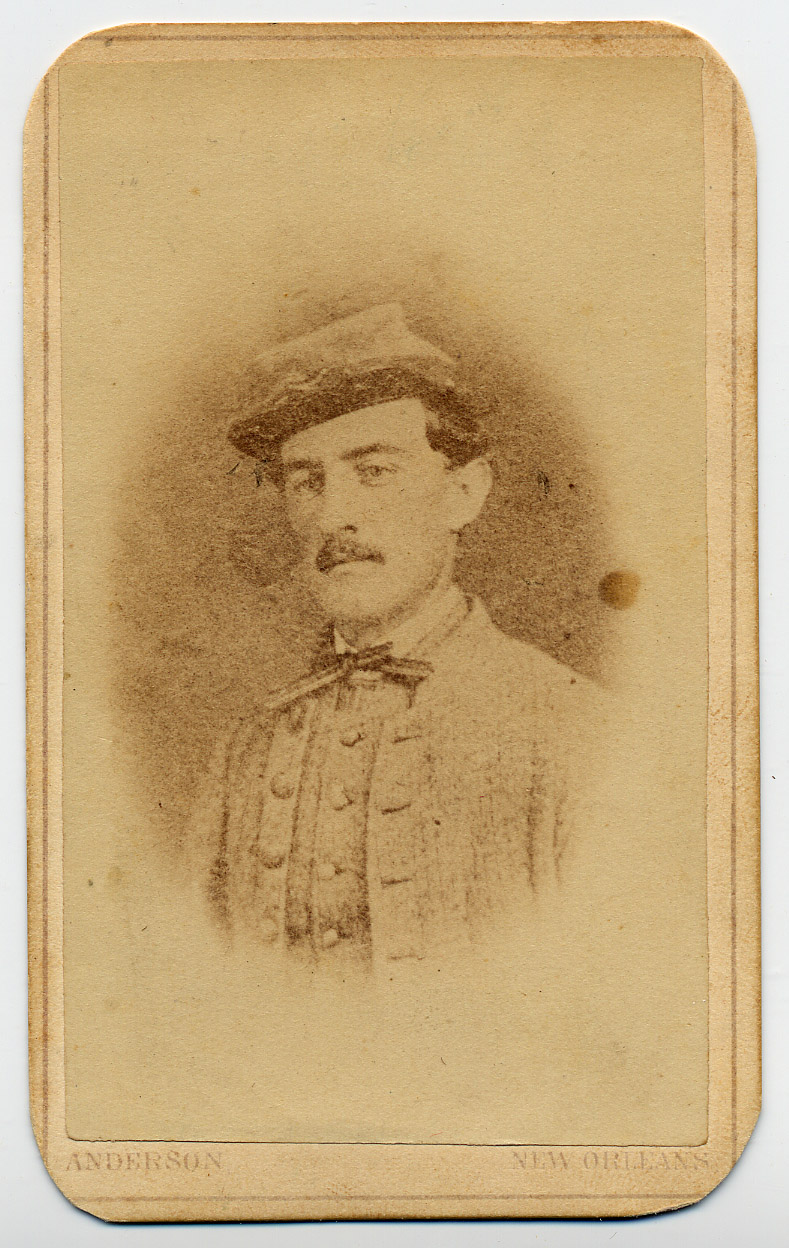
“With his last breath
whispering into Slocomb’s ear, ‘Captain, haven’t I done my
duty?’
W. W. “Billy” Sewell killed at Dallas, Georgia May 28, 1862
The men of
the Washington Artillery often witnessed scenes too gruesome to recount.
However, many tried; probably to show the horrors of war, probably to document
the tribulations of their fellow comrades. Either way, these accounts, though
graphic, served their purpose well. They often had a common theme. When called
upon to give that dreaded last full measure, a soldier’s final thoughts were
often of religion, loved ones or dedication to duty- sometimes giving oral last
wills and testaments. No wonder why the men often found themselves in song; if
they hadn’t, they might have all gone insane.
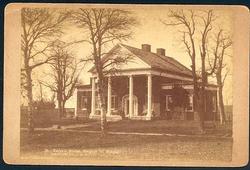
House at
Mayre's Heights, Fredericksburg near where WA was entrenched
Mayre’s
Heights, Fredericksburg, Va., December 13, 1863
During
the hottest time of this engagement the Twenty-fifth North Carolina volunteers
reached the hill where Captain Miller’s Third Company of Washington Artillery
guns were planted and poured volleys into the lines of the advancing enemy;
then, dashing down the hill to the sunken road, stood shoulder to shoulder with
[Major Robert] Cobb’s brave Georgians. In passing through Miller’s guns, their
fallen bodies had to be dragged from our muzzles before they could be fired. Corporal
[Francis Dunbar] Ruggles had picked up a blanket which one of them had dropped
in Squire’s redoubt, saying, ‘Boys, this will be a good thing to have tonight.’
A few moments afterward with his sleeves rolled up and his youthful figure all
aglow with the excitement, holding his sponge-staff in his hand ready to ram the
cartridge home, he threw up his hands and fell backward, killed. … When the
gallant Ruggles is killed, [W.F.] Perry springs forward and seizes the
sponge-staff as it falls from poor Ruggles’ hands, but in an instant he is
disabled by a shot through the arm which drops helplessly to his side. [J.E.]
Rodd, who has been holding vent has his elbow shattered. [C.A.] Everett takes
his place and he also goes down disabled. He is laid in the corner of the
redoubt with Ruggles’ lifeless body, but fearless to the last, calls to the boys
to let him do something; ‘cut fuse if nothing else.’ Now [C.A.] Falconer, who
was passing back of the gun, is shot behind the ear, and falls a corpse. Poor
Ruggles- he used the blanket that night, but as a burial shroud.
Henry Baker, First
Company, WA
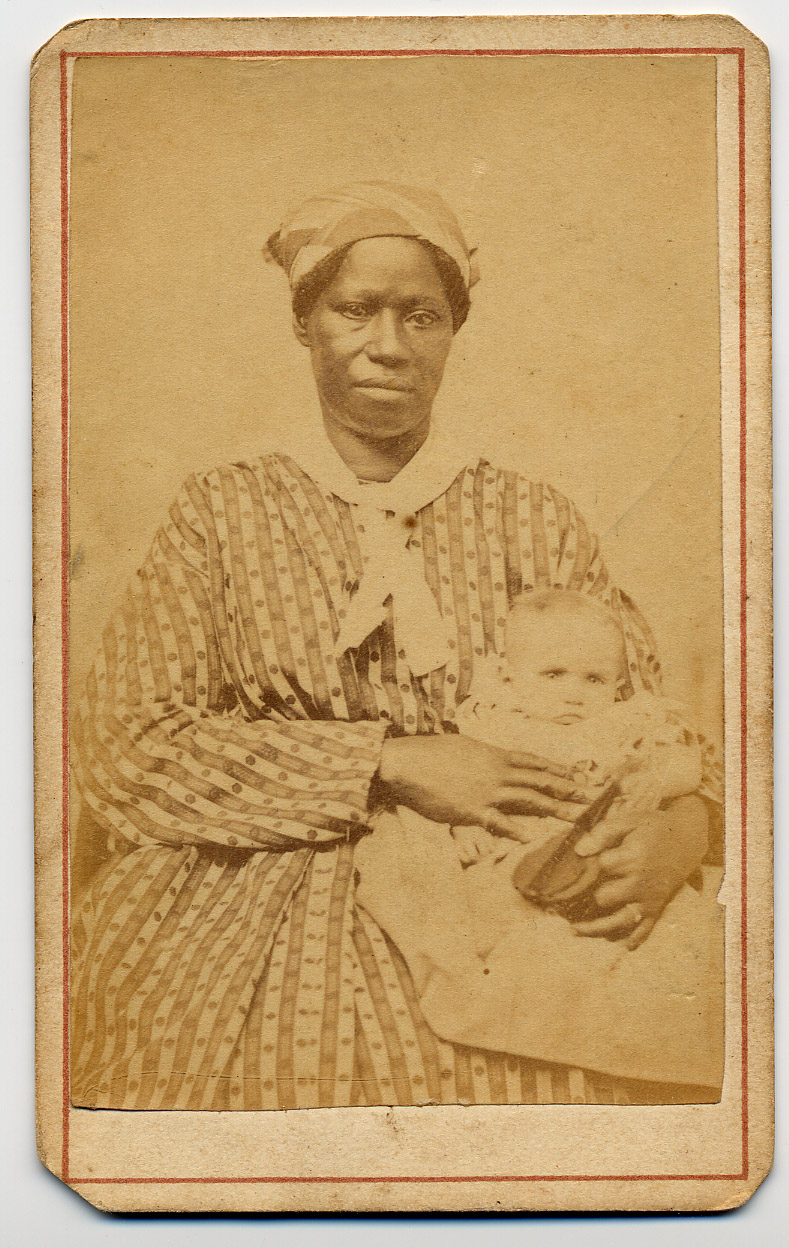
His
Legacy
This cdv shows
Charles A. Falconer, Jr. with “Aunt Mary,” his servant.
Charles’
father died performing his duty at Fredericksburg, Virginia in 1863.
Dallas,
Georgia, May 27, 1864
T’
was here, at Dallas, that Tom B. Winston was killed. An awful shriek rang out into
the air! Shall I ever forget it? It pierced high above the dreadful din. ‘Oh-h-h
Christ Almighty!’ That is what the voice said. Voice of anguish in tones that
froze the blood. It was Tom Winston. His legs were torn off just below the
waist. As we went on fighting, a hasty backward glance saw him borne away on a
stretcher, his face and mangled form covered, a shapeless, shrouded heap. Not
dead, but fatally hit. He died that night. One of the saddest deaths at
Jonesboro was Louie Vincent. Not over seventeen- a short, thick set, fair haired
boy from New York. Gentle, good natured, faithful for duty. Our works were in a
miserable state … We were exposed enough as it was, and men were being hit. …
The ceaseless din of firing went on all about us- the ping, pang, thud, and hiss
of the sharpshooters’ bullets. It was a desperate plight. Something must be
done. … Louie sprang up, spade in hand. I do not think he had thrown but one
spade full of dirt, when he was struck. … ‘I am killed,’ he cried. [Felix]
Arroyo laid him gently down on his side in the trench, the blood gushing in
torrents from the mouth. Only one word more, escaped his lips, ‘Mother!’ That
mother, alas, was far away and could not help. May it not have been that the
very best help a mother can give her boy, she had already given, in prayer and
instruction and loving Christian example, laying him at Jesus’ feet, I cannot
say.
Philip Stephenson, Fifth
Company, WA
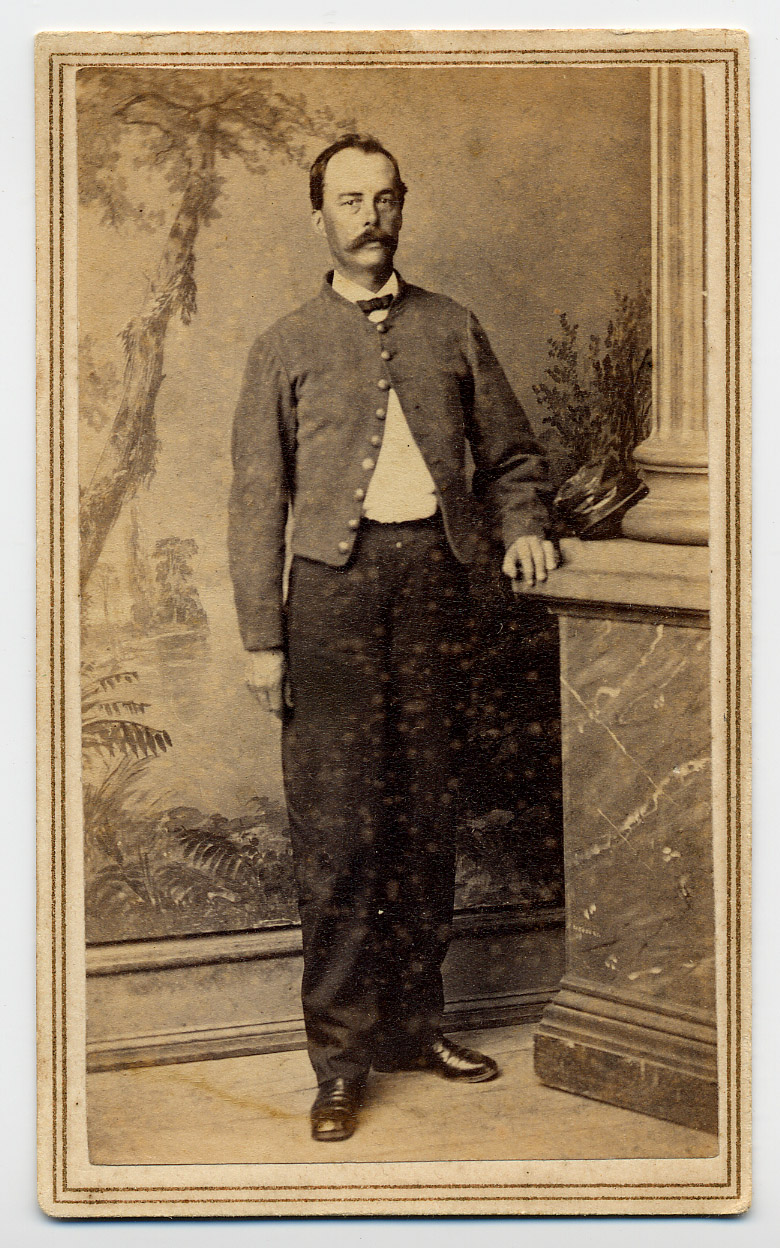
Felix
Arroyo
who
comforted the young dying Tom Winston.
The 5th
Company had two Arroyos in the unit at the time of the battle of Fredericksburg,
Charles and Felix.
Then there
were always thoughts of disgrace and how one might act in battle. Confederate
units, as Union, were often composed of friends, relatives, or fellow partisans.
This gave cohesion to the unit and reduced chances of cowardice among its
members.
How
great a misfortune a soldier considers it to be, to be disgraced in battle, and
what dejection and downcast looks settle upon his face where the reputation of
his regiment has in any degree been tarnished…A company or regiment that once
showed signs of weakness, makes its own soldiers ten times more distrustful of
each other’s valor in the next engagement, and unless the demoralization has
been cured, and confidence restored, is a source of danger rather than of
strength to an army, and will inevitably damn the reputation of any good men who
happen to be connected with it.
Napier Bartlett, Third
Company, WA
Pine
Mountain, Georgia, June 14, 1864-
One such
example was “a Frenchman of 5th Company named Barrail [sic, Pvt. A.
Barriel]. He was a Parisan [sic], proscribed by Louis Napoleon for the part he
had taken in the last uprising against him. His body was covered with scars; it
is said received in France. He was of middle age and stature, stout and
soldierly, of stern countenance and temper, taciturn, unsociable but faithful,
fearless, reliable, a valuable man. … Yet this man became a coward. Comrades
noticed it, but nothing was said. The change in him grew as dangers multiplied,
until, at Dallas, he showed manifest fear and a comrade had to take his place at
the gun. He then, at the first opportunity, crept back to the caissons in a
sheltered spot. …Our officers were indulgent and let him alone. … He was never
seen at the front, where the guns were. The man was completely cowed.
When the
shades of evening closed in around us that day on Pine Mountain, and the enemy’s
‘dogs of war’ were finally muzzled, the usual inquiry ran along the line, ‘Is
anybody hurt?’ No one at the guns. But word comes from the rear, that one is
killed there. And behold that one is Barrail! Back in that sheltered
little depression, almost like a cave where the wagons and caissons were parked,
Death searched him out and found him – leaning over a fire, frying pan in hand,
preparing his supper. One of the last shells burst in his face and scattered his
brains amid his supper in the pan! Death seemed to send the whisper it his heart
beforehand, ‘I am coming.’
Philip Stephenson, Fifth
Company, WA
Peach Tree
Creek at the edge of Atlanta, July 20, 1864
Oscar Legare,
age 17, but full developed, a magnificent specimen of a man, 6 feet or more, was
corporal of piece 3. As fearless a spirit as ever lived. He chafed at our defeat
and at our silence under the enemy’s fire. Springing to his gun, he called his
men to action. He was just in the act of sighting the gun, stooping behind the
reinforce, when a parrott shell struck the gun at the swell or reinforce,
disabled it, exploded and emptied itself and its contents full into the face,
head, and upper body of Oscar. … torn to pieces from the waist up. We found long
strips of flesh high up on the trees behind them.
Philip Stephenson, Fifth
Company, WA
Arthur
Fremantle, British observer of the war, recalled viewing the dedication of one
of the Southern artillerists of General Polk’s corps,
“I myself remember a
fine-looking man who had both his hands blown off at the wrists by unskilful
[sic] artillery-practice in one of the early battles. A currycomb and brush were
fitted into his stumps, and he was engaged in grooming artillery horses with
considerable skill. This man was called a hostler; and as the war drags on, the
number of these handless hostlers will increase.”
It must have
been a constant mental battle to see fallen comrades, dead, wounded and dying,
along the roadside. Often the question was asked, “Why him and not me?” Such was
the case of Napier Bartlett who documented his thoughts while passing fellow
Confederates at Gettysburg prior to his participation there the following day.
Gettysburg,
Pennsylvania, July 2, 1863
It was
not a particularly pleasant business any way to be worn out with marching and
then to be forced to mediate upon your chances for the morrow’s battle.
Especially as I can remember was the case at Gettysburg, when the dead and dying
of the two days preceding fights are lying on every side of you. You are
compelled to witness every stage of the death- from the unhappy victim
trembling with the last shiver of dissolution, to that of the corpse who sits
upright with staring eyes, or whose stiffened arm seems to point you yourself
the road to perdition on the morrow.
Napier Bartlett, Third
Company, WA
Thomas E. Williams was
one of those members of the Washington Artillery wounded during the July 3rd
Gettysburg artillery duel. He recovered from his wounds in time to take part in
the defense of Petersburg, Virginia in 1864. By then he was a seasoned veteran
and knew about the hazards of warfare, both emotionally and physically. On
February 13, 1864 this single, poor, and humble soldier wrote this emotional
last will and testament while awaiting his fate in the trenches of that town.
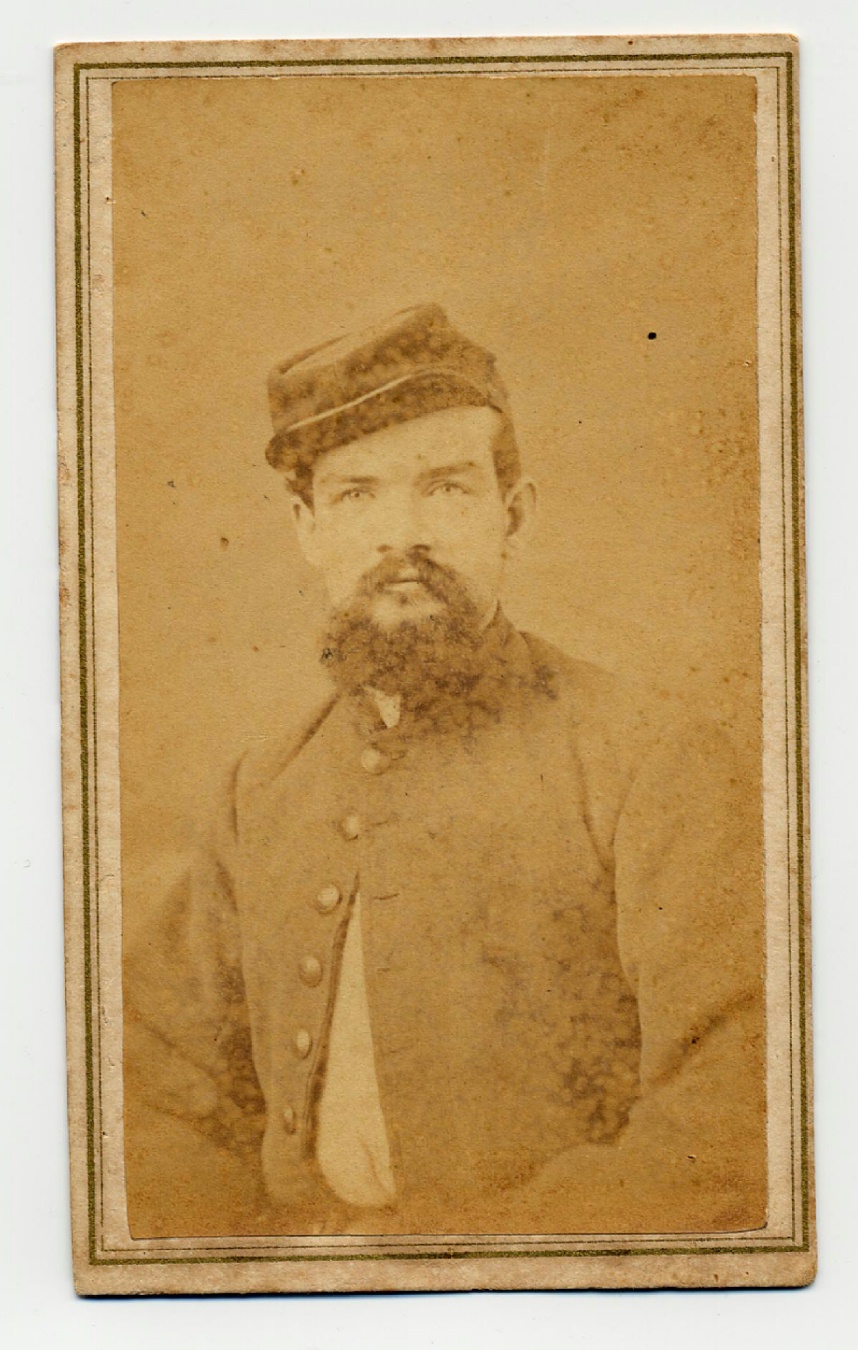
Thomas E. Williams
Eternal and Ever Blessed
God,
I desire to present myself
before you with the deepest humiliation of soul. … I come acknowledging myself
to have a great offending weight upon my breast and say with the humble
proclamation ‘God be merciful to me, a sinner.’ … This day do I, with the utmost
solemnity, surrender myself to thee. I denounce all former evils that have
dominated over me. I consecrate to thee all that I am & all that I have: the
faculties of my mind, the members of my body, my worldly possessions, my time,
and my influence over others, to be all used entirely for thy glory. … And when the hour of death
comes, may I remember thy Covenant, well ordered in all things and sure,
as my Salvation, though every hope and desire is perishing. …
Amen, T. E. Williams Petersburg,
Virginia
Williams’ will was not
needed at Petersburg. He survived the siege and went on to fight during the
battalion’s retreat to Appomattox. His devotion to his company and the Southern
cause led him to refuse surrender with General Lee’s troops there and fled with
many of his fellow members “into the mountains.” He finally surrendered and was
paroled almost a month later in Charlotte, North Carolina on May 5, 1865.
Like the
stress placed on Thomas Williams at Petersburg, the toll of war mounted upon the
minds of many a soldier. But not all had the fortitude to continue fighting and
killing. The following letter was written by John M. Colby, who served in both
the Louisiana Confederate navy as a member of the Crescent Artillery Company A
and the Confederate army as a member of New Orleans’ Crescent Regiment, to his
distant aunt living in the north. Colby, a relative of several Washington
Artillery members, was “burned out” with war and returned home to New Orleans to
take the oath of allegiance to the United States.
New Orleans, October 11, 1863
My Dear Aunt,
I have been
in the Army and Navy of the Confederacy, have been taken prisoner twice and
finally come home a sadder, if not a wiser man. I was married here in 1856 at
the age of 19, lost my only dear child in 58 and wife in 60. Thrown upon the
world with such early dissapointment [sic] and with no attachments it was no
wonder that I should throw all my energies into a cause that has caused the
death of many a better, better man than myself. The horror of Civil Warfare
experienced in two short years have brought me over to the Peace Society and God
grants the time is not far distant when this unholy, unnatural war will be
finished. I have three cousins in the famous Washington Artillery and much of my
schoolmates and associates are either in the rebel service, killed, or like
myself, tired of soldiering. You, who have at home amid plenty, know not the
horrors of this war. I hope … that peace is not far off and our great country is
once more restored to dignity and Union for “United We Stand” against the whole
world; for this nation is now like France was under Napolean [sic], as a nation
of soldiers, not citizens.
Despite these differences
of opinion between Confederate soldiers about the need for the continuation of
war, members of the Washington Artillery, like many other Confederate soldiers,
managed to maintain their sense of dignity and honor, despite their surrounding
world of destruction and horror. Henry Baker may have reflected the thoughts of
many Confederate veterans after the war when he said, “I try to forget all the
horrible acts of cruelty inflicted upon the Southern people at that time. Yet, I
never felt any resentment against the Union soldiers; they, like myself, were
fighting for a principle that was dear to their hearts, they to preserve the
Union, and we to protect our homes and the rights guaranteed us by the
Constitution.” He remembered one such episode that proved his point. “Our
battery was changing its position one day during a hot skirmish. I darted
through a piece of woods and ran upon a desperately wounded Yankee soldier. He
was startled when he saw me, and begged me not to kill him. I took off my
canteen of water and handed it to him. ‘Do you suppose.’ I said, ‘that the
Confederate soldiers kill their wounded enemy?’”
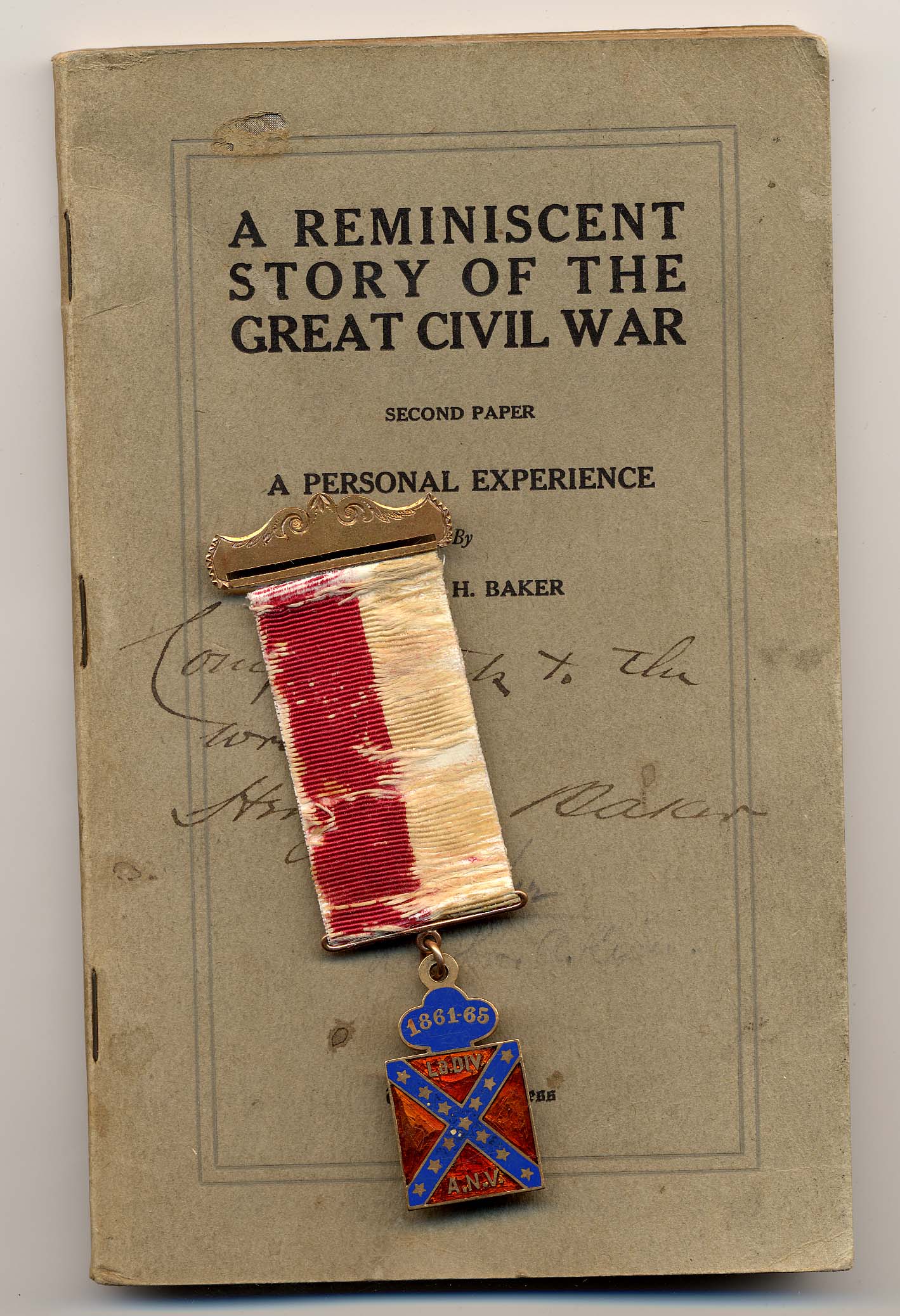
UCV medal and
book written by Henry H. Baker
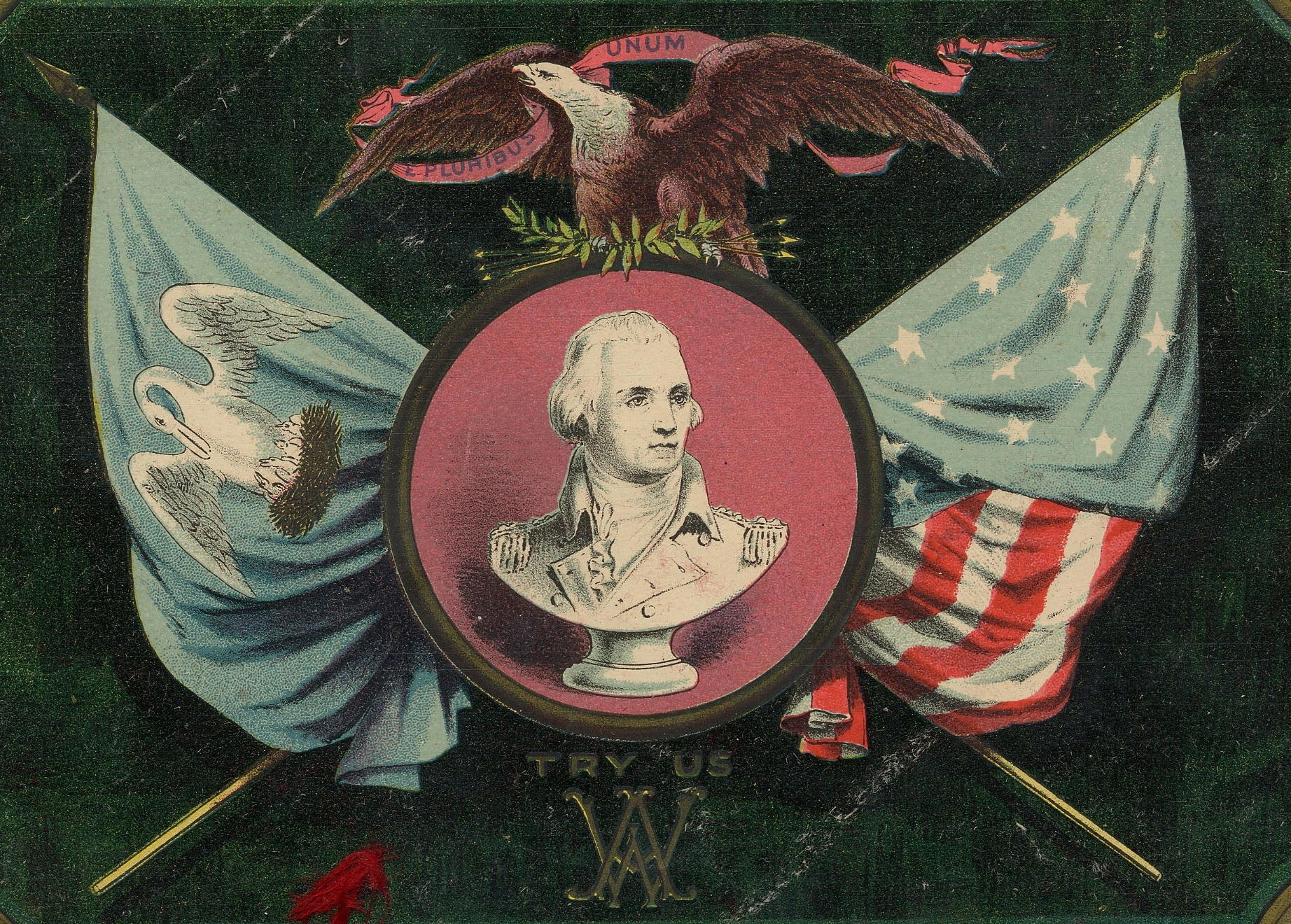
HOME